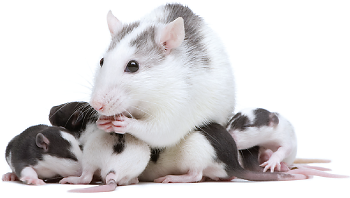SSRI Study Raises Concerns About Brain-Development Impact
Abstract
Researchers at the University of Mississippi Medical Center in Jackson have published findings they say indicate that fetal and infant exposure to selective serotonin reuptake inhibitors (SSRIs) should be examined in humans, particularly those with developmental dysfunction such as autism spectrum disorder (ASD).
In the study funded by the National Institutes of Health and published online October 24 in the Proceedings of the National Academy of Sciences, Kimberly Simpson, Ph.D., an associate professor in the Department of Neurobiology and Anatomical Sciences at the University of Mississippi Medical Center, and colleagues showed that rat pups perinatally exposed to the SSRI citalopram exhibited impaired social behavior and response to novelty and that perinatal drug exposure seemed to affect males more severely than females, suggesting a sexually dimorphic response in the rat model.

Behavioral deficits in rat pups like these might be similar to those seen in children with ASD.
“Interestingly, the present investigation has demonstrated an increased incidence of neophobia [fear of anything new] and disrupted juvenile play when rat pups are exposed to citalopram,” wrote Simpson and colleagues. “Moreover, we have shown that reduced social play behavior is more obvious in drug-exposed male vs. female animals. Although we do not suggest that the juvenile play behavior that we assess corresponds to a specific trait dimension of ASD, our findings are consistent with the possibility that dysregulation/dysfunction of the serotonin (5-HT) system during early brain development may be the critical contributing factor in the etiology of ASD.”
The researchers observed substantial brain abnormalities in the treated rats, including stunted growth and degeneration of the corpus callosum, respon sible for communication between the two hemispheres of the brain. They also saw dramatic reductions in the density of neuronal fibers in the raphe system, the key brain serotonin circuit known to shape the developing brain during the critical period in which the animals were exposed to the drug.
“Importantly, our present findings reveal that exposure to SSRIs can alter the course of development of the rodent fetal nervous system, including an impact on neural network function and behavior; whether such actions occur in humans is unknown,” the researchers noted.
Experts who reviewed the study for Psychiatric News warned about overestimating the connection between SSRI administration and results seen in the study.
“This study arrives in the context of other recent studies [Psychiatric News, August 5], and it’s easy to get very worked up about data like this, but I don’t think we should conclude from this that we have an association,” Lisa Catapano, M.D., an assistant professor of psychiatry at George Washington University Medical Center, told Psychiatric News. “There’s the question of how an animal model of behavior—in this case, neophobia and disrupted play behavior—is related to human ASD.”
“Current studies in humans are not conclusive,” Catapano continued. “Women with mental health issues are more likely to have children with ASD. Having a family history of psychiatric disease increases the likelihood of ASD in children. And there is clear evidence that untreated women with depression are likely to have negative and adverse consequences and be unable to maintain a healthy pregnancy without therapeutic assistance.”
Louis Kraus, M.D., chief of child and adolescent psychiatry at Rush University Medical Center in Chicago, agreed with Catapano: “This study really does not tell us anything regarding the association, whether causal or not, of the effect of SSRIs in pregnant women and increased incidences of autism. I am concerned that this information could be used as a rationale for pregnant women to not use SSRIs” for conditions in which the medication may offer considerable benefit.
Catapano pointed out that only a few of the rats in the study were exposed to citalopram prenatally, and those exposed perinatally received extremely high doses of citalopram. “We shouldn’t overestimate the connection,” she said. “The most direct next step would be prenatal exposure in rats at therapeutic doses.”
“Perinatal Antidepressant Exposure Alters Cortical Network Function in Rodents” is posted at <www.pnas.org/content/early/2011/10/19/1109353108.full.pdf+html>.



